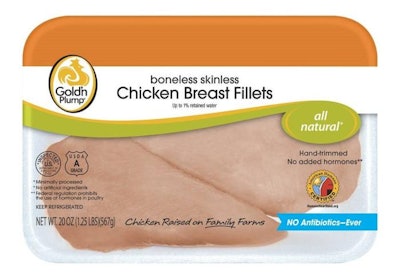
Before GNP Company fully transitions its flagship chicken brand, Gold’n Plump, to carry the no antibiotics ever label, it is doing all it can to make sure the consumers understand exactly what kind of products are at the store.
The company, headquartered in Saint Cloud, Minnesota, in February announced its intent to have all of its products under the Gold’n Plump brand come from chickens that were never given antibiotics of any sort. The transition is going well, said Rory Bidinger, brand manager for Gold’n Plump, and part of that transition is educating consumers about what it is doing, and what different labels mean.
The decision to transition Gold’n Plump to antibiotic-free production
The transition of the Gold’n Plump brand is not GNP Company’s first experience with antibiotic-free poultry production. The company has been producing another antibiotic-free brand, Just BARE, since 2009.
With the success of the Just BARE brand, and realizing more companies are responding to consumer concerns about antibiotic use, GNP decided to also make Gold’n Plump a no-antibiotics ever offering.
“We see consumers are increasingly concerned about knowing more about how the chicken was raised and how the meat was handled throughout the processing elements,” said Bidinger. “We’ve seen that coming for quite some time, and laid the groundwork for growing no-antibiotics ever [chickens] with the launch of our Just BARE brand.”
While the process to fully make the switch will take several years, it has gone smoothly to this point as they work with veterinarians and contract growers, Bidinger said.
“We have a network of family farm partners located throughout Minnesota and Wisconsin who have been a tremendous help to implement this program. It takes a lot of work on their end, and they’ve been fantastic partners in helping this along,” he said.
The company has been working with a third-party auditor, the American Humane Association, which has been working with GNP Company through the process as it attains the American Humane Certified designation.
Clearing up confusion
As GNP Company prepared to transition its Gold’n Plump brand into a product line that did not involve the use of antibiotics, it wanted to make sure that the consumers who would be buying the products had a clear understanding of what they were reading on labels at the grocery store.
With the veterinary feed directive rule soon to take effect, and more poultry companies reducing their use of antibiotics amid concerns about a possible link between antibiotic use and antimicrobial resistance, a lot of different labels are now appearing on poultry products.
But do people really understand what those labels mean?
To find out, GNP Company launched its own research study to get a sense of consumer confusion, Bidinger said. In that study, 1,000 consumers from across the United States were surveyed, concerning their level of understanding of what certain labels mean.

Rory Bidinger
The study’s results showed that more than half of U.S. consumers are confused about what certain labels mean.
Commonly used phrases like “all natural” say little. Even the use of the phrase “antibiotic-free” is misleading, because all chicken products in commerce are required by law to have no antibiotic residues, so they are in fact, antibiotic-free, even if antibiotics had once been administered to the animals. There are also those who state their chicken products are raised with chickens that were not treated with antibiotics also used in human medicine. Gold’n Plump products, are from birds that have never been treated with antibiotics of any sort under any circumstance.
The study also revealed:
- About 26 percent of shoppers do not trust labeling claims
- About 36 percent of shoppers say the “no antibiotics ever” label is important to them when making a purchasing decision
- Nearly 32 percent believe that humanely raised means higher quality and 33 percent of shoppers consider humanely raised a factor in whether they buy the product
- Around 42 percent say the claims need a certification (such as American Humane Certified) to instill trust
To help clarify confusion or misconceptions about different antibiotic-related labels, GNP Company has launched its own educational campaign.
On a GNP website, GoodChickenMission.com, is a printable tool to help shoppers with easy-to-understand definitions that allow them to better understand their options and make more informed decisions when shopping. The website also has an online chicken package tutorial that includes explanations of the main label claims on the All Natural line of Gold’n Plump products.
Bidinger said that the company will also be active on social media such as Facebook and Twitter, providing “little nuggets of information to understand labeling claims and what the labeling we use means.”
“The more we can do as an industry, particularly in the meat and poultry industry, to help educate the consumers, the better,” Bidinger said.
Animal welfare issues
When it comes to raising poultry or livestock without the use of antibiotics, a common concern is whether animals are getting the type of veterinary care they need.
Bidigner said that while the chickens raised for its Just BARE products are raised without antibiotics and the same will be the case for its Gold’n Plump products, the company still believes in the responsible use of antibiotics in animal care.
“GNP believes in the judicious use of antibiotics, and by that we mean there will always be a time and a need and a place for the use of antibiotics just to provide humane care for our animals,” he said. “As we have our veterinary staff closely monitoring our flocks, and if there should be a situation that we do have a flock that becomes ill, we provide antibiotics just to provide the humane treatment of those flocks and make sure that they are getting the care they need.”
However, Bidinger said when GNP flocks show signs of health conditions that would be helped by the use of antibiotics, they are treated but not used for the products that carry the no antibiotics ever label.
“We have processes in place and outlets to bring those flocks to other product lineups within the company,” he said.
Most of those chickens treated with antibiotics are used for GNP Company production of products that are for industrial use or for private label use, he added.
Working with the American Humane Association, GNP Company gets valuable insights from an outside party to make sure that the birds are getting the type of care they deserve.


















